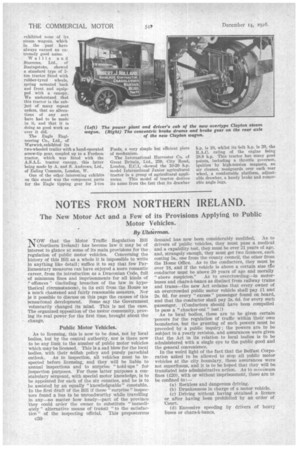NOTES FROM NORTHERN IRELAND.
Page 54

If you've noticed an error in this article please click here to report it so we can fix it.
The New Motor Act and a Few of its Provisions Applying to Public Motor Vehicles.
By Ulsterman.
NOW that the Motor Traffic Regulation Bill (Northern Ireland) has become law it may be of interest to glance at some of its main provisions for the regulation of public motor vehicles. Concerning the history of this Bill as a whole it is impossible to write In anything like detail ; suffice it to say that few Parliamentary measures can have enjoyed a more romantic career, from its introduction as a Draconian Code, full of minimum fines and imprisonments for all kinds of " offences" (including breaches of the law in hypothetical circumstances), to its exit from the House as a much chastened and fairly reasonable measure. Nor is it possible to discuss on this page the causes of this Sensational development. Some say the Government voluntarily changed its mind. This is not the ease. The organized opposition of the motor community, proving its real power for the first time, brought about the change.
Public Motor Vehicles.
As to licensing, this is now to be done, not by local bodies, but by the central authority, nor is there now to be any limit to the number of public motor vehicles which may be licensed. This is a sad blow for the local bodies, with their Selfish policy and purely parochial outlook. As to inspection, all vehicles must be inspected before licensing, and they will be liable to annual inspections and to surprise " hold-ups " for inspection purposes. For these latter purposes a constabulary sergeant, with special motor knowledge, is to be appointed for each of the six counties, and he is to be assisted by an equally "knowledgeable" constable. In the first draft of the Bill if these "surprise') inspectors found a bus to be =roadworthy while travelling in any—no matter how lonely—part of the province they could order the owner to substitute " immediately " alternative means of transit "to the satisfaction" of the inspecting official. This preposterous
c30 • demand has now been considerably modified. As to drivers of public vehicles, they must pass a medical and a capability test, they must be over 21 years of age, and, strangely enough, they must get two licences, each costing 5s., one from the county council, the other from the Home Office. As to the conductors, they must be over 18, and if the vehicle is above a certain size de conductor must be above 20 years of age and morally "above suspicion." As to overcrowding—in motorbuses and chars-h-bancs as distinct from railway trains and trams—the new Act ordains that every owner of an overcrowded public motor vehicle shall pay £1 and 2s. 6d. for every " excess " passenger found on board, and that the conductor shall pay 2s. 6d. for every such passenger. (Conductors should have been compelled to pass a " chucker-out " test !) As to local bodies, these are to be given certain powers for the regulation of traffic within their own boundaries, but the granting of such powers must be preceded by a public inquiry ; the powers are to be subject to a yearly revision, and assurances were given that the Act in its relation to local bodies is to be administered with a single eye to the public good and the general convenience.
In the weird light of the fact that the Belfast Corporation asked to be allowed to stop all public motor vehicles at the city boundary, these assurances were not superfluous, and it is to be hoped that they will be translated into administrative action. As to minimum fines caw, with or without imprisonment, these are to be confined to
(a) Reckless and dangerous driving.
(b) Drunkenness in charge of a motor vehicle.
(c) Driving without having obtained a licence or• after having been prohibited by an order of Court.
(d) Excessive speeding by drivers of heavy buses or chars-h-bancs.












































































































